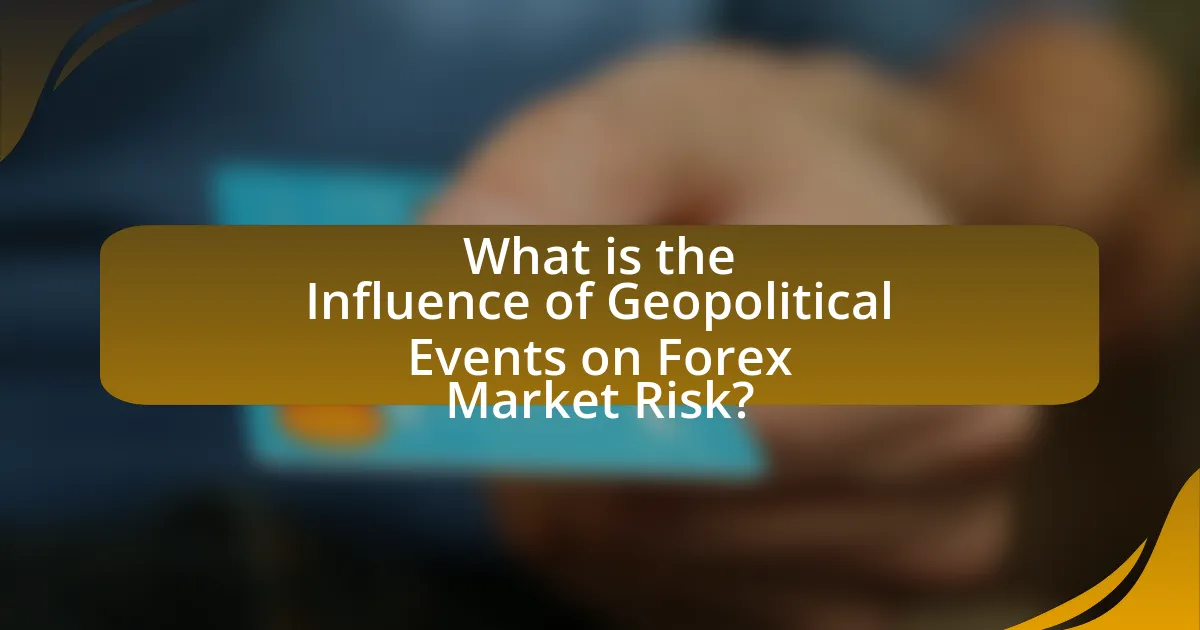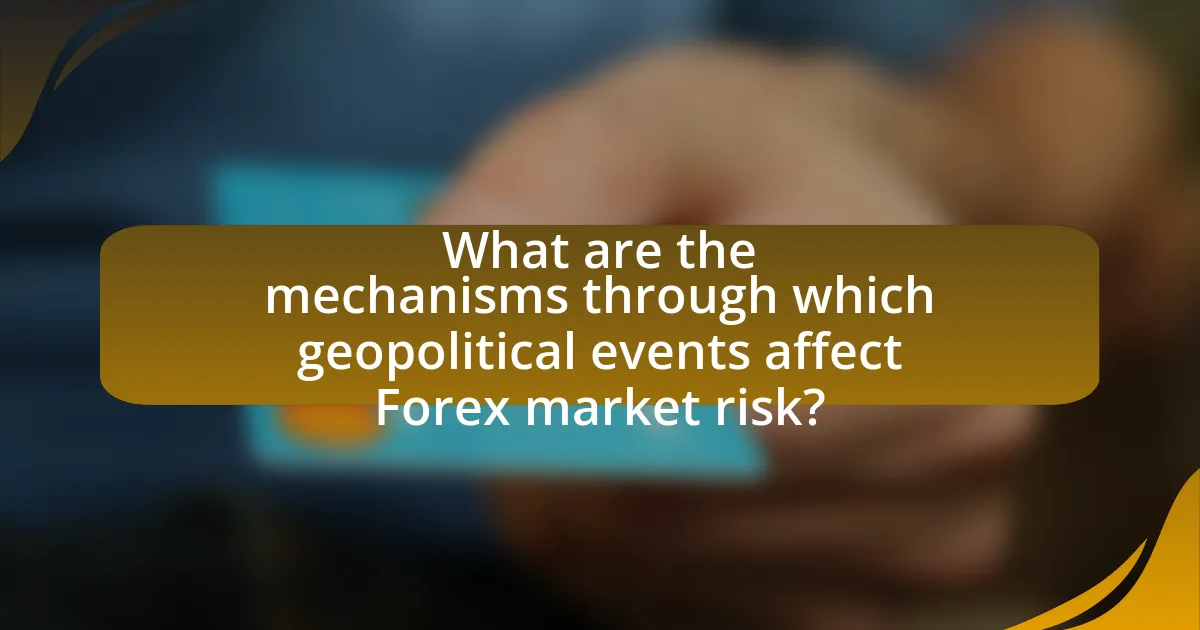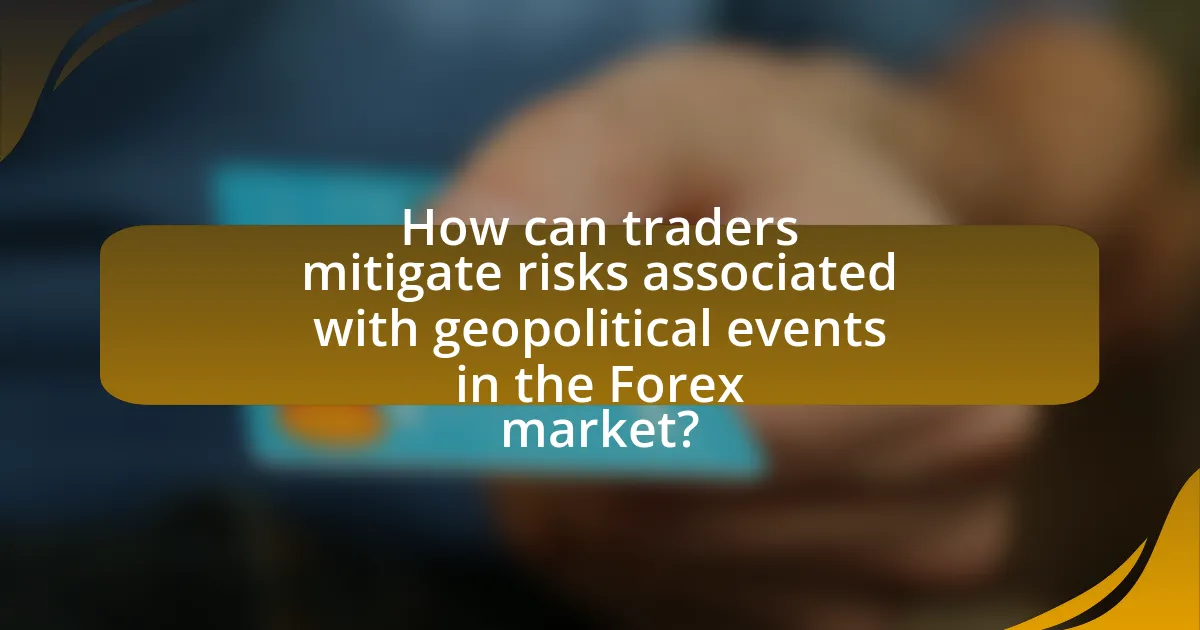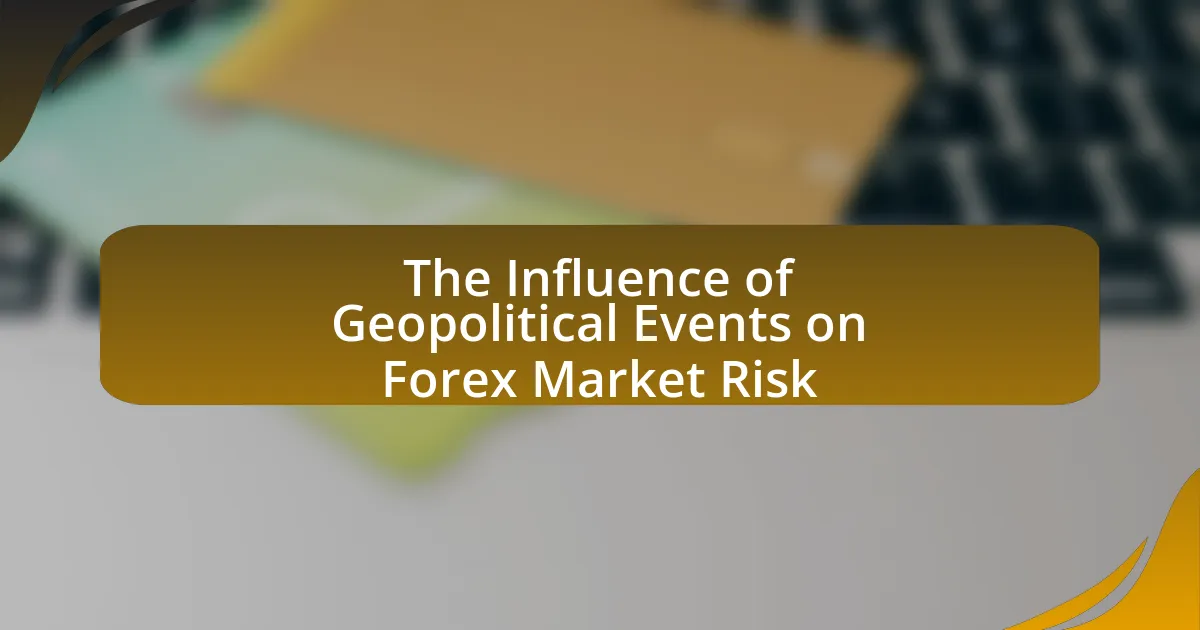The article examines the significant influence of geopolitical events on Forex market risk, highlighting how factors such as military conflicts, trade disputes, and political instability create volatility and uncertainty in currency valuations. It discusses the mechanisms through which these events impact investor sentiment and economic stability, leading to rapid fluctuations in currency values. Key historical examples, including the Brexit referendum and the U.S.-China trade war, illustrate the direct correlation between geopolitical tensions and currency risk. Additionally, the article outlines strategies for traders to mitigate risks associated with these events, emphasizing the importance of diversification, risk management, and staying informed about global developments.

What is the Influence of Geopolitical Events on Forex Market Risk?
Geopolitical events significantly influence Forex market risk by creating volatility and uncertainty in currency valuations. For instance, events such as military conflicts, trade disputes, or political instability can lead to rapid shifts in investor sentiment, prompting currency traders to react swiftly. Historical examples include the Brexit referendum in 2016, which caused the British pound to drop sharply against major currencies due to uncertainty about the UK’s economic future. Similarly, the U.S.-China trade war has led to fluctuations in the Chinese yuan and the U.S. dollar as markets reacted to tariffs and trade negotiations. These events highlight how geopolitical factors can directly impact currency risk, leading to increased volatility and potential losses for traders.
How do geopolitical events impact currency values?
Geopolitical events significantly impact currency values by influencing investor sentiment and economic stability. For instance, political instability, such as conflicts or regime changes, often leads to a decrease in investor confidence, resulting in currency depreciation. Historical examples include the 2016 Brexit referendum, which caused the British pound to drop sharply due to uncertainty surrounding the UK’s economic future. Additionally, sanctions imposed on countries, like those on Russia following its annexation of Crimea in 2014, can lead to a decline in the value of the affected nation’s currency as foreign investment diminishes. These events create volatility in the forex market, as traders react to perceived risks and potential economic repercussions.
What types of geopolitical events are most influential?
The most influential types of geopolitical events include military conflicts, trade agreements, and political instability. Military conflicts, such as the Russia-Ukraine war, can lead to significant fluctuations in currency values due to heightened uncertainty and risk aversion among investors. Trade agreements, like the US-China trade deal, can impact economic forecasts and currency strength based on expected trade flows and tariffs. Political instability, exemplified by events like Brexit, can create volatility in forex markets as investors react to potential changes in economic policies and governance. These events are critical as they directly affect investor sentiment and economic indicators, leading to shifts in currency valuations.
How do these events create volatility in the Forex market?
Geopolitical events create volatility in the Forex market by introducing uncertainty and risk, which can lead to rapid fluctuations in currency values. For instance, events such as elections, military conflicts, or trade negotiations can significantly impact investor sentiment and economic forecasts. When tensions rise, traders often react by buying safe-haven currencies like the US dollar or Swiss franc, while selling riskier currencies, resulting in sharp price movements. Historical data shows that during the Brexit referendum in 2016, the British pound experienced a drop of over 10% against the dollar within days, illustrating how geopolitical events can trigger immediate and substantial volatility in currency markets.
Why is understanding this influence important for traders?
Understanding the influence of geopolitical events on the Forex market is crucial for traders because these events can significantly impact currency values and market volatility. For instance, geopolitical tensions, such as conflicts or trade disputes, often lead to fluctuations in investor sentiment, which can cause rapid changes in exchange rates. Historical data shows that during the 2016 Brexit referendum, the British pound experienced a sharp decline, illustrating how political events can create immediate and substantial market reactions. Therefore, traders who comprehend these influences can make more informed decisions, manage risks effectively, and capitalize on potential opportunities in the Forex market.
What risks do traders face without this understanding?
Traders face significant financial risks without understanding the influence of geopolitical events on the Forex market. This lack of comprehension can lead to poor decision-making, resulting in substantial losses during times of political instability or economic sanctions. For instance, historical data shows that currency values can fluctuate dramatically in response to geopolitical tensions, such as the 2016 Brexit referendum, which caused the British pound to drop by over 10% in a matter of hours. Without awareness of these dynamics, traders may fail to hedge against potential volatility, exposing themselves to unexpected market movements and increased trading costs.
How can knowledge of geopolitical events improve trading strategies?
Knowledge of geopolitical events can significantly enhance trading strategies by providing insights into market volatility and potential price movements. Traders who stay informed about events such as elections, conflicts, or trade agreements can anticipate shifts in currency values, as these events often lead to increased uncertainty and risk. For instance, the 2016 Brexit referendum caused the British pound to drop sharply against the dollar, illustrating how geopolitical developments can directly impact forex markets. By analyzing historical data and trends related to such events, traders can develop more informed strategies that capitalize on expected market reactions, thereby improving their chances of success in volatile conditions.

What are the mechanisms through which geopolitical events affect Forex market risk?
Geopolitical events affect Forex market risk primarily through changes in investor sentiment, economic stability, and government policies. Investor sentiment shifts due to uncertainty surrounding geopolitical tensions, leading to increased volatility in currency values. For example, during the Brexit referendum in 2016, the British pound experienced significant fluctuations as investors reacted to the potential economic implications of the UK’s exit from the EU. Economic stability is also impacted; conflicts or political instability can disrupt trade and investment flows, as seen in the Syrian civil war, which affected the value of currencies in the region. Additionally, government policies, such as sanctions or military interventions, can lead to currency depreciation or appreciation, as evidenced by the sanctions imposed on Russia in 2014, which resulted in a sharp decline in the Russian ruble. These mechanisms illustrate how geopolitical events can create significant risks in the Forex market.
How do economic indicators relate to geopolitical events?
Economic indicators are closely linked to geopolitical events as they reflect the economic health and stability of nations, which can be significantly affected by political tensions, conflicts, or diplomatic relations. For instance, during geopolitical crises, such as the Russia-Ukraine conflict, economic indicators like GDP growth rates, inflation, and unemployment rates can fluctuate due to sanctions, trade disruptions, and shifts in investor confidence. Historical data shows that in the wake of the 2008 financial crisis, geopolitical instability in the Middle East led to spikes in oil prices, which in turn impacted inflation rates and economic growth in various countries. Thus, economic indicators serve as a barometer for assessing the potential impact of geopolitical events on national and global economies.
What specific economic indicators are affected by geopolitical tensions?
Geopolitical tensions specifically affect economic indicators such as inflation rates, currency exchange rates, and stock market volatility. Inflation rates can rise due to supply chain disruptions caused by conflicts, as seen during the 2014 Ukraine crisis, which led to increased energy prices. Currency exchange rates are influenced as investors seek safe-haven assets during geopolitical instability, exemplified by the appreciation of the Swiss Franc and Japanese Yen during crises. Stock market volatility often spikes in response to geopolitical events, with the VIX index reflecting increased uncertainty and risk, as observed during the Gulf War and various other conflicts.
How do these indicators influence trader sentiment?
Indicators such as economic data releases, geopolitical tensions, and central bank announcements significantly influence trader sentiment by shaping expectations about market conditions. For instance, positive economic indicators like strong employment figures can boost trader confidence, leading to increased buying activity in the forex market. Conversely, geopolitical tensions, such as conflicts or trade disputes, often create uncertainty, prompting traders to adopt a more cautious or risk-averse stance, which can result in selling pressure on currencies perceived as riskier. Historical data shows that during periods of heightened geopolitical risk, such as the Brexit referendum in 2016, trader sentiment shifted dramatically, leading to increased volatility and significant currency fluctuations. This demonstrates that indicators directly impact how traders perceive risk and make decisions in the forex market.
What role does market psychology play in Forex trading during geopolitical events?
Market psychology significantly influences Forex trading during geopolitical events by driving trader sentiment and behavior. When geopolitical tensions arise, such as conflicts or political instability, traders often react emotionally, leading to increased volatility in currency pairs. For instance, during the Brexit referendum in 2016, market psychology caused the British pound to plummet as uncertainty about the UK’s future in the EU heightened trader anxiety. This reaction illustrates how fear and uncertainty can lead to rapid sell-offs or buying frenzies, impacting exchange rates. Additionally, historical data shows that currencies of nations involved in geopolitical conflicts typically experience depreciation due to perceived risk, further validating the critical role of market psychology in shaping Forex trading outcomes during such events.
How do traders react to news of geopolitical events?
Traders typically react to news of geopolitical events by adjusting their positions in the forex market to mitigate risk and capitalize on potential volatility. For instance, when a geopolitical crisis arises, such as military conflict or significant political instability, traders often seek safe-haven currencies like the US dollar, Swiss franc, or Japanese yen, leading to increased demand for these currencies. Historical data shows that during the 2016 Brexit referendum, the British pound experienced significant fluctuations, dropping over 10% against the dollar in response to the uncertainty surrounding the event. This behavior illustrates how traders actively respond to geopolitical news by reallocating their investments based on perceived risks and opportunities in the market.
What psychological biases can affect trading decisions in these situations?
Psychological biases that can affect trading decisions during geopolitical events include loss aversion, overconfidence, and herd behavior. Loss aversion leads traders to prioritize avoiding losses over acquiring gains, often resulting in irrational decision-making during volatile situations. Overconfidence can cause traders to overestimate their knowledge and predictive abilities, leading to excessive risk-taking. Herd behavior occurs when traders follow the actions of others rather than relying on their analysis, which can exacerbate market movements in response to geopolitical events. Research by Barberis and Thaler (2003) highlights how these biases can distort market efficiency, particularly in times of uncertainty.

How can traders mitigate risks associated with geopolitical events in the Forex market?
Traders can mitigate risks associated with geopolitical events in the Forex market by employing strategies such as diversification, using stop-loss orders, and staying informed about global developments. Diversification across different currency pairs reduces exposure to any single geopolitical event, thereby minimizing potential losses. For instance, during the Brexit referendum in 2016, traders who held a diversified portfolio were less affected by the volatility in the British pound compared to those who concentrated their investments solely in GBP.
Additionally, implementing stop-loss orders allows traders to automatically exit positions at predetermined price levels, limiting losses during sudden market movements triggered by geopolitical tensions. For example, during the U.S.-Iran tensions in early 2020, traders who had set stop-loss orders were able to protect their capital from rapid declines in affected currencies.
Finally, staying informed about geopolitical developments through reliable news sources and economic indicators enables traders to anticipate market reactions and adjust their strategies accordingly. Historical data shows that currencies often react sharply to news related to trade agreements, military conflicts, or elections, making timely information crucial for effective risk management.
What strategies can be employed to manage Forex market risk?
To manage Forex market risk, traders can employ strategies such as diversification, hedging, and the use of stop-loss orders. Diversification involves spreading investments across various currency pairs to reduce exposure to any single currency’s volatility. Hedging, on the other hand, allows traders to protect their positions by taking offsetting positions in correlated assets, thereby minimizing potential losses from adverse market movements. The implementation of stop-loss orders helps limit losses by automatically closing positions at predetermined price levels, ensuring that traders do not incur excessive losses during sudden market fluctuations. These strategies are effective in mitigating risks associated with geopolitical events, which can lead to significant market volatility and unpredictable currency movements.
How can diversification help in risk management?
Diversification helps in risk management by spreading investments across various assets, thereby reducing exposure to any single asset’s volatility. This strategy mitigates the impact of adverse geopolitical events on the forex market, as different currencies may react differently to such events. For instance, during a geopolitical crisis, while one currency may depreciate, another might appreciate, balancing overall portfolio performance. Historical data shows that diversified portfolios tend to experience lower volatility and higher risk-adjusted returns compared to concentrated portfolios, reinforcing the effectiveness of diversification in managing risk.
What tools and resources are available for monitoring geopolitical events?
Tools and resources available for monitoring geopolitical events include news aggregators, social media platforms, geopolitical risk analysis services, and specialized databases. News aggregators like Google News and Reuters provide real-time updates on global events, while social media platforms such as Twitter offer immediate insights and public sentiment. Geopolitical risk analysis services, such as Stratfor and the Economist Intelligence Unit, deliver in-depth reports and forecasts on political developments. Additionally, databases like the Global Database of Events, Language, and Tone (GDELT) track and analyze news coverage worldwide, providing valuable data for understanding geopolitical trends. These resources collectively enable analysts and traders to assess the potential impact of geopolitical events on markets, including the Forex market.
What best practices should traders follow during periods of geopolitical uncertainty?
Traders should prioritize risk management and diversification during periods of geopolitical uncertainty. Implementing stop-loss orders can help limit potential losses, while diversifying portfolios across different asset classes can mitigate risks associated with specific geopolitical events. Historical data shows that during the 2008 financial crisis, traders who utilized stop-loss strategies were able to reduce their losses significantly compared to those who did not. Additionally, maintaining a close watch on news and geopolitical developments allows traders to make informed decisions, as markets often react swiftly to such events.
How can traders stay informed about relevant geopolitical developments?
Traders can stay informed about relevant geopolitical developments by utilizing real-time news platforms, subscribing to financial news services, and following expert analysts on social media. These sources provide timely updates on events that can impact market conditions, such as elections, conflicts, and trade agreements. For instance, platforms like Bloomberg and Reuters offer breaking news alerts and in-depth analysis, which are crucial for understanding the implications of geopolitical events on currency fluctuations. Additionally, economic calendars that highlight key political events can help traders anticipate market movements, as historical data shows that significant geopolitical events often lead to increased volatility in the Forex market.
What are the common pitfalls to avoid when trading during geopolitical events?
Common pitfalls to avoid when trading during geopolitical events include overreacting to news, neglecting risk management, and failing to consider market volatility. Traders often overreact to headlines, leading to impulsive decisions that can result in significant losses. For instance, during the Brexit referendum in 2016, many traders faced substantial losses due to rapid market fluctuations driven by emotional responses rather than informed analysis. Additionally, neglecting risk management strategies, such as setting stop-loss orders, can expose traders to excessive risk, especially in unpredictable environments. Lastly, failing to account for increased market volatility can lead to unexpected price movements; for example, the U.S.-China trade tensions in 2019 caused sharp fluctuations in currency pairs, highlighting the importance of anticipating volatility when trading during such events.
